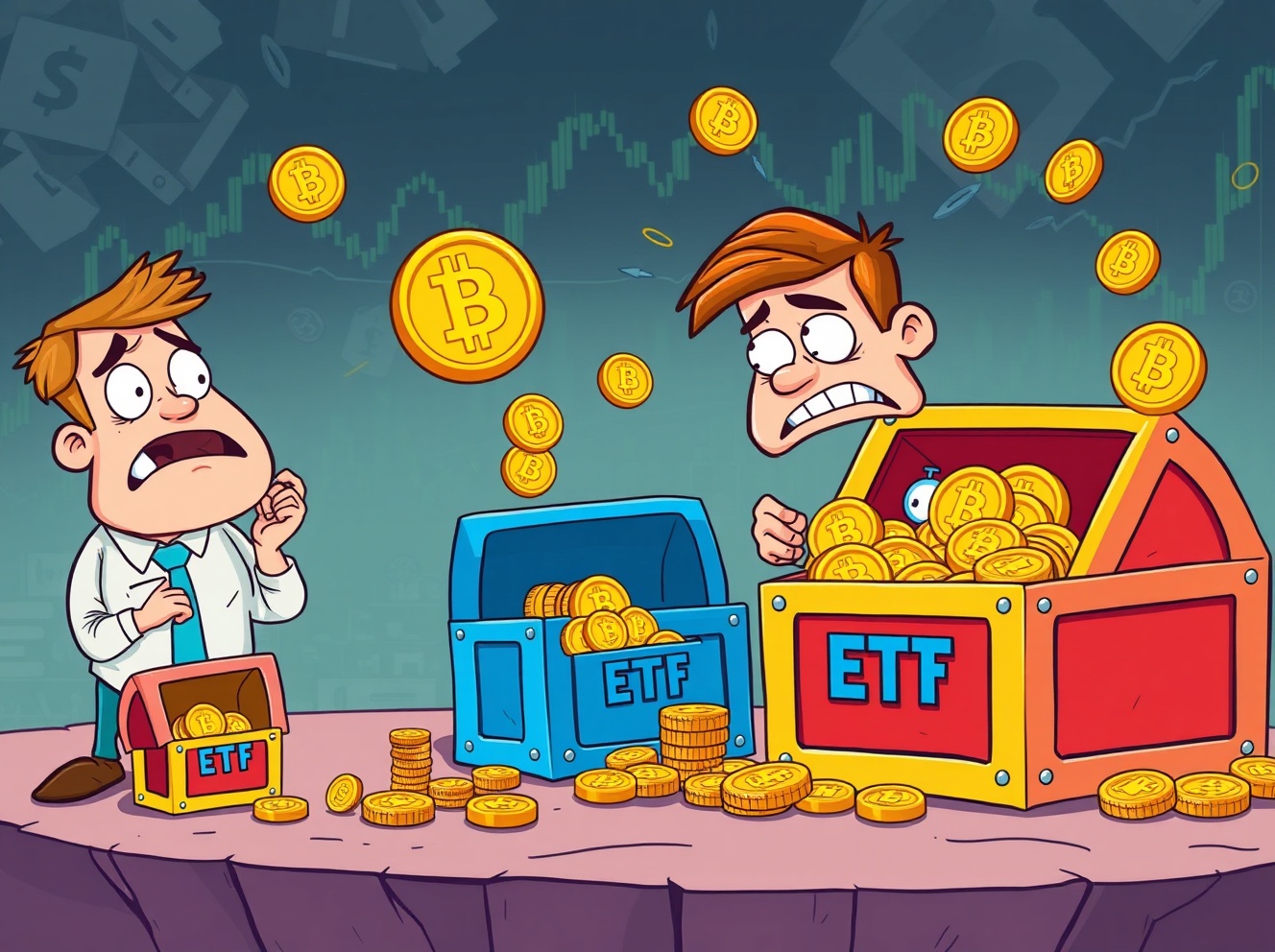Bitcoin ETFs Face Alarming $145.4M Outflow: BlackRock Leads Massive Withdrawals
0
0

BitcoinWorld

Bitcoin ETFs Face Alarming $145.4M Outflow: BlackRock Leads Massive Withdrawals
Are you tracking the latest movements in cryptocurrency investments? The US spot Bitcoin ETFs just recorded a shocking $145.4 million net outflow, reversing the previous day’s gains and sending ripples through the digital asset market. This significant shift in investor sentiment demands immediate attention from anyone involved in Bitcoin ETFs.
What Caused the Bitcoin ETFs Outflow Surge?
According to data from TraderT, the outflow pattern reveals crucial insights about institutional behavior. BlackRock’s IBIT experienced the largest withdrawal at $143.48 million, representing the majority of the total outflow. This massive movement from one of the world’s largest asset managers signals potential concerns about short-term Bitcoin ETF performance.
Other major players also contributed to the outflow trend. Ark Investment’s ARKB saw $11.65 million exit, while Bitwise’s BITB recorded a $5.79 million withdrawal. The coordinated nature of these outflows suggests broader market forces at play rather than isolated investor decisions.
Is There Any Positive News for Bitcoin ETFs?
Despite the overwhelming outflow trend, Fidelity’s FBTC emerged as the lone bright spot. The fund attracted $15.49 million in net inflows, demonstrating that some investors remain confident in specific Bitcoin ETFs. This divergence in performance highlights the importance of fund selection even within the same asset class.
The market for Bitcoin ETFs continues to show volatility as investors weigh various factors:
- Regulatory developments affecting cryptocurrency
- Broader market conditions and risk appetite
- Specific fund management strategies and track records
- Short-term price movements in underlying Bitcoin assets
What Do These Bitcoin ETFs Movements Mean for Investors?
The sudden return to outflows after just one day of net inflows indicates ongoing uncertainty in the Bitcoin ETF space. This volatility pattern suggests that investors are actively rebalancing their positions rather than making long-term commitments to these Bitcoin ETFs.
For current investors in Bitcoin ETFs, this development serves as a crucial reminder to monitor fund flows regularly. The concentration of outflows in specific funds like BlackRock’s IBIT underscores the need for diversified exposure across multiple Bitcoin ETFs to mitigate single-fund risk.
How Should You Approach Bitcoin ETFs Now?
The recent $145.4 million outflow from Bitcoin ETFs doesn’t necessarily signal a long-term trend reversal. However, it does emphasize the importance of understanding fund-specific dynamics within the broader Bitcoin ETF ecosystem. Smart investors should consider both the quantitative data and qualitative factors when evaluating their Bitcoin ETF positions.
Key considerations for Bitcoin ETF investors include:
- Track fund flow patterns over multiple periods
- Analyze fund manager reputation and strategy
- Monitor overall market sentiment toward Bitcoin
- Consider dollar-cost averaging to manage volatility
Final Thoughts on Bitcoin ETFs Market Movement
The $145.4 million net outflow from US spot Bitcoin ETFs serves as a powerful reminder of the dynamic nature of cryptocurrency investments. While short-term fluctuations can be concerning, they also present opportunities for informed investors who understand the underlying market mechanics of Bitcoin ETFs.
The divergence between Fidelity’s inflows and other funds’ outflows suggests that selective investment strategies may outperform broad market approaches in the volatile Bitcoin ETF space. As always, thorough research and careful position sizing remain essential for navigating these digital asset waters successfully.
Frequently Asked Questions
What are Bitcoin ETFs?
Bitcoin ETFs are exchange-traded funds that track the price of Bitcoin, allowing investors to gain exposure to cryptocurrency without directly holding digital assets.
Why did Bitcoin ETFs experience outflows?
The outflows likely resulted from investor profit-taking, market uncertainty, or portfolio rebalancing strategies amid changing market conditions.
Should I be worried about investing in Bitcoin ETFs?
While outflows indicate short-term sentiment shifts, they don’t necessarily reflect long-term prospects. Investors should consider their risk tolerance and investment horizon.
Which Bitcoin ETF performed best during the outflow period?
Fidelity’s FBTC was the only fund to record net inflows, attracting $15.49 million while others experienced withdrawals.
How often do Bitcoin ETFs experience significant outflows?
Bitcoin ETFs can experience regular flow fluctuations based on market conditions, though $145 million represents a substantial single-day movement.
Can I still invest in Bitcoin ETFs after this outflow?
Yes, outflows don’t prevent new investments. However, investors should research current market conditions and fund specifics before committing capital.
Found this analysis of Bitcoin ETFs outflow helpful? Share this crucial market insight with fellow investors on social media to help them stay informed about the latest cryptocurrency investment trends. Your network will appreciate staying ahead of Bitcoin ETF developments!
To learn more about the latest Bitcoin trends, explore our article on key developments shaping Bitcoin institutional adoption.
This post Bitcoin ETFs Face Alarming $145.4M Outflow: BlackRock Leads Massive Withdrawals first appeared on BitcoinWorld.
0
0
 Manage all your crypto, NFT and DeFi from one place
Manage all your crypto, NFT and DeFi from one placeSecurely connect the portfolio you’re using to start.





